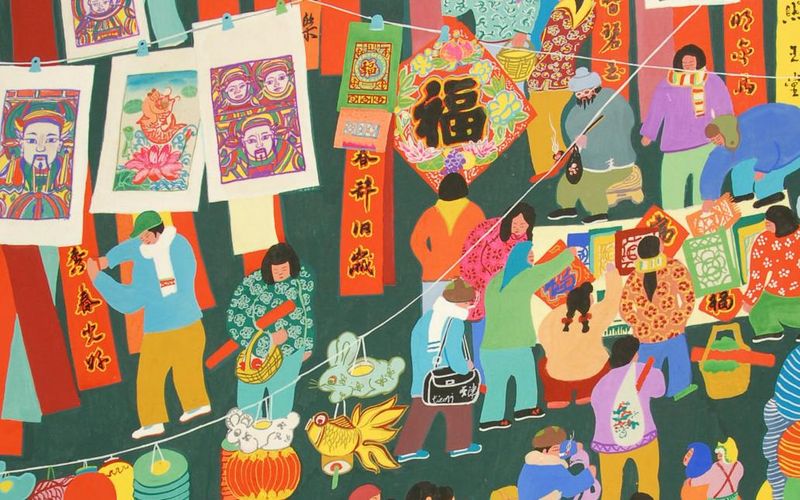Sun, 22 Jan
2 pmIMLEK
the Chinese New Year in Indonesia
Imlek – the Chinese New Year in Indonesia
We cordially invite you to celebrate the Chinese New Year Festival at the Weltmuseum Wien! You can expect a free cultural program in the Hall of Columns, as well as the now legendary “Object Speed Dating” with objects matching Chinese New Year, presented by curator Bettina Zorn. The highlight of the event, however, is undoubtedly the performance of the Dragon Dance (naga) and Lion Dance (barongsai). Do not miss it!
The Chinese Spring Festival is also known as the New Year and is celebrated all over the world by people of Chinese descent. It refers to the lunar calendar and marks the end of winter and the beginning of spring. The festival has little to do with Confucius or with Buddhism. It is much older. Its beginnings are said to date back to the time of King Huang Di (2698–2598 BCE).
The Chinese Spring Festival is also celebrated in Indonesia, because many people who immigrated from China live there. The so-called “Peranakan” have been living in Indonesia for several generations, but have kept their Chinese traditions throughout this period.
During the rule of President Suharto, the Chinese minority was suppressed and persecuted. Their customs were officially banned since 1967. It was not until 2000 that the celebration of Chinese festivals was allowed again, and since 2002 the Chinese Spring Festival Day has been celebrated as a national holiday. Since there are no seasons in the tropical climate, it is called Chinese New Year (Imlek) in Indonesia.
Imlek is celebrated as a family festival in Indonesia. A day before, the house, altar, and temple are cleaned to drive away evil spirits. Family members gather to eat and drink together. They send prayers for good luck, blessings, harmony, and wealth to the deities of their respective religions.
At New Year itself, ancestors are also remembered. It is also traditional to give a red envelope with money (ang pao) to loved ones. Paper cutouts with wishes and lanterns, all in red, hang outside the door and in the house, symbolizing hope, happiness, and vitality.
The lion dance (barongsai) and the dragon dance (naga) are also part of the New Year celebration.
Program
2 p.m. Opening, Dragon and Lion Dance
Dragon and Lion Dance (Shaolin Culture Centre Vienna)
Prosperity Noodle Tradition, Indonesian Embassy in Austria
3 p.m. Chinese New Year as celebrated in Indonesia
Storytelling: Benjamin Nathaniel
Dance performance: Tari Betawi and Denok Deblong, Indonesian dances with Chinese influence (Gema Puspa Nusantara Tanz Gruppe ) and
presentation of the Barongsai and the Naga from Indonesia (Indonesian Embassy in Austria). Duration 60 min.
4 p.m. Object Speed Dating with curator Bettina Zorn
In the familiar speed dating manner, we invite visitors to enter into conversation with each other through objects from the museum’s collection as well as from the private collection of the curator for China, Korea and Japan, Bettina Zorn. Our visitors change tables every three minutes and encounter both new objects and people. You do not need any previous knowledge.
5 p.m. Dragon and Lion Dance
Shaolin Culture Centre Vienna
5.30 p.m. End of the event
Duration: 210 min. / 3.5 hrs.
Admission: free
No registration required
Meeting Point: Hall of Columns

